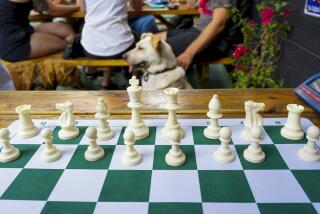Chess Team Quits Kasparov Internet Game
- Share via
NEW YORK — A worldwide team of Internet chess players resigned its game against world champion Garry Kasparov on Friday after a gripping, four-month battle on a Microsoft Web site that broke new ground in chess theory.
Kasparov, 36, considered by many experts to be the best player in the history of the ancient game, was about to promote his only remaining pawn to a second queen in a technically complex endgame while “The World” team ran out of opportunities to force a draw.
The game, described by Kasparov and Microsoft as an experiment for chess playing on the Internet, was closely fought. A new move in chess theory played by “The World” in the Sicilian Defense on its 10th turn surprised the champion.
Kasparov opened with the white pieces June 21 at a ceremony in New York, and the contest lasted longer than many had expected, ending Friday on the 62nd move.
Microsoft gaming zone production manager Eddie Ranchigoda said more than 50% of the Internet voters opted for resignation, which under the rules conceded the contest to the Russian.
Microsoft said that over the course of the game, the site received more than 3 million visitors from more than 75 countries.
Kasparov declined immediate comment on the outcome, but he said by telephone from Moscow that next week he would discuss his analysis of the game.
On the Web site Thursday, when it was already clear that he was heading for victory against the Internet all-comers, he issued a statement through game commentator Danny King, a grandmaster from England.
“At move 10, I congratulated The World on a great opening novelty, and to that I would like to add it was a phenomenal middle game, a crazy human endgame,” the statement said. “And now we have a computerized queen and pawn ending of mathematical precision.
“Within our game we have covered all the elements of modern chess. I thank The World for a great fight.”
Entry to the site and to vote every two days on a move was free.
Both sides were able to use computers. Representatives from the Grandmaster Chess School in St. Petersburg, Russia, joined the effort by publishing in-depth analysis on their Web site.
More to Read
Sign up for Essential California
The most important California stories and recommendations in your inbox every morning.
You may occasionally receive promotional content from the Los Angeles Times.












